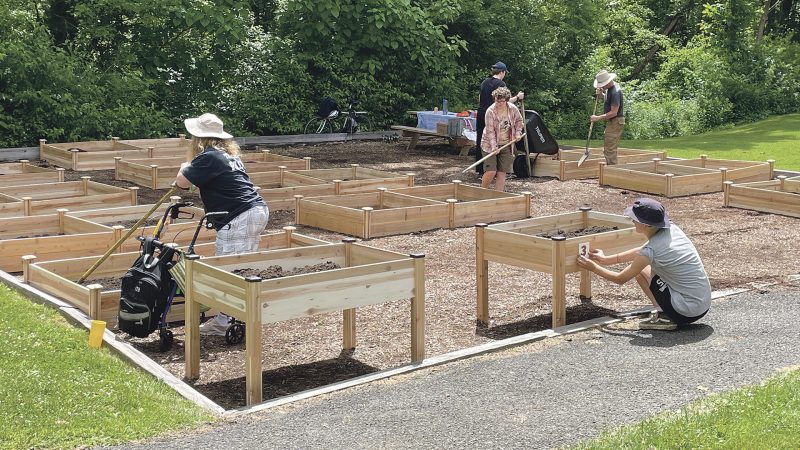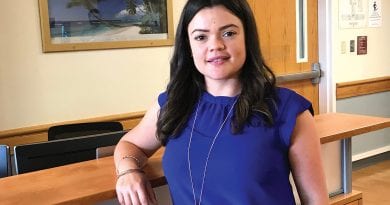Grow Food Northampton Makes Broad Impact on Region
Root Causes
By Joseph Bednar bednar@businesswest.com
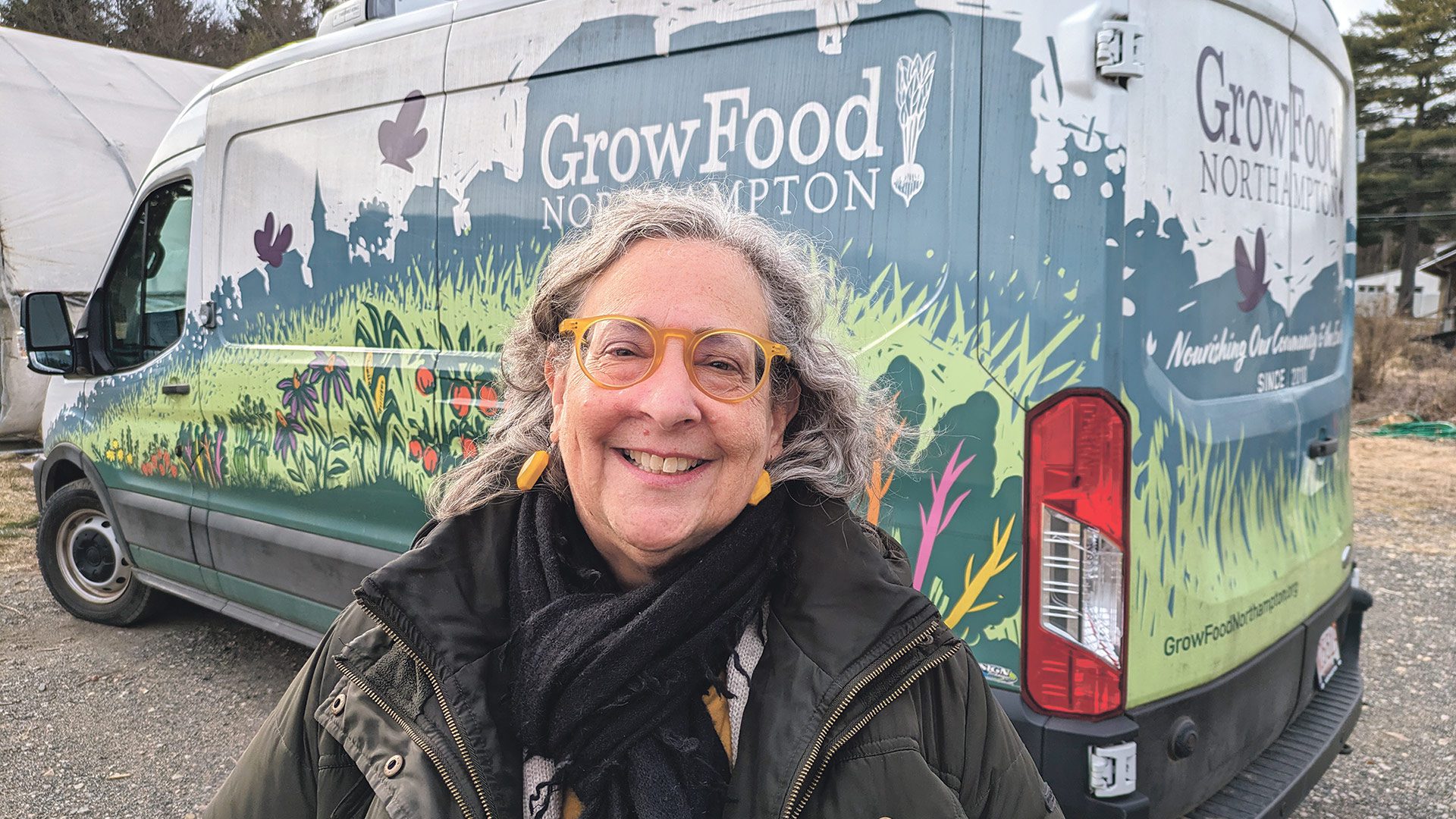
Alisa Klein has spent her entire career in the nonprofit world, working on public-health matters, domestic-violence and sexual-abuse prevention, and other issues close to her heart that affect the welfare of her neighbors. So Grow Food Northampton (GFN) was an easy fit.
She had long been involved with the Florence-based nonprofit as one of the initial donors in its land purchase more than 15 years ago, and since then as a participant in its community farm.
But what sparked her further involvement was her work as a city councilor in Northampton from 2014 to 2020, where she established a select committee on pesticide reduction and wrote and sponsored legislation to prohibit the use of pesticides in municipal spaces.
“In writing that legislation, I did a lot of research about the effects of pesticides, and the committee was established to do research on pesticides and how they affect public health,” said Klein, who is also a long-time organic gardener. “I realized how incredibly important it is not only that we eat food that doesn’t have pesticides on it, but that we are utilizing growing practices that aren’t using harmful chemicals.
“I realized how incredibly important it is not only that we eat food that doesn’t have pesticides on it, but that we are utilizing growing practices that aren’t using harmful chemicals.”
“I had been working for a long time at that point, about 20 years, in interpersonal violence prevention, on sexual- and domestic-violence issues, and was ready for something that was a little more life-affirming, and the Grow Food Northampton job opened up,” she said of taking the job of executive director five years ago. “I was so excited to focus on another passion of mine, which was organic growing of vegetables, and I knew there was a lot of opportunity to broaden the program.”
Grow Food Northampton’s stated mission is to “create a just and resilient local food and farming system that nourishes our community and protects and enriches the earth.” At the heart of that mission is its 121-acre community farm in Florence, where the organization does the following:
- Leases low-cost farmland to 10 small farms (including four farms owned and operated by farmers of color, including a collective of 20 Somali Bantu refugee families);
- Runs a 320-plot organic community garden for more than 400 community members, more than 35% of whom receive subsidized plots to grow food for themselves and their families;
- Operates a ‘giving garden’ that grows thousands of pounds of food annually for donation to local food pantries and community meal sites;
- Conducts collaborative research projects with academics and others on sustainable agricultural practices that enhances climate resilience; and
- Provides extensive land- and food-based educational programming for children and adults.
In addition, GFN conducts free mobile farmers markets that support more than 65 local farms by buying their produce and delivering it to community members experiencing food insecurity, while also conducting healthy food knowledge and nutrition programming.
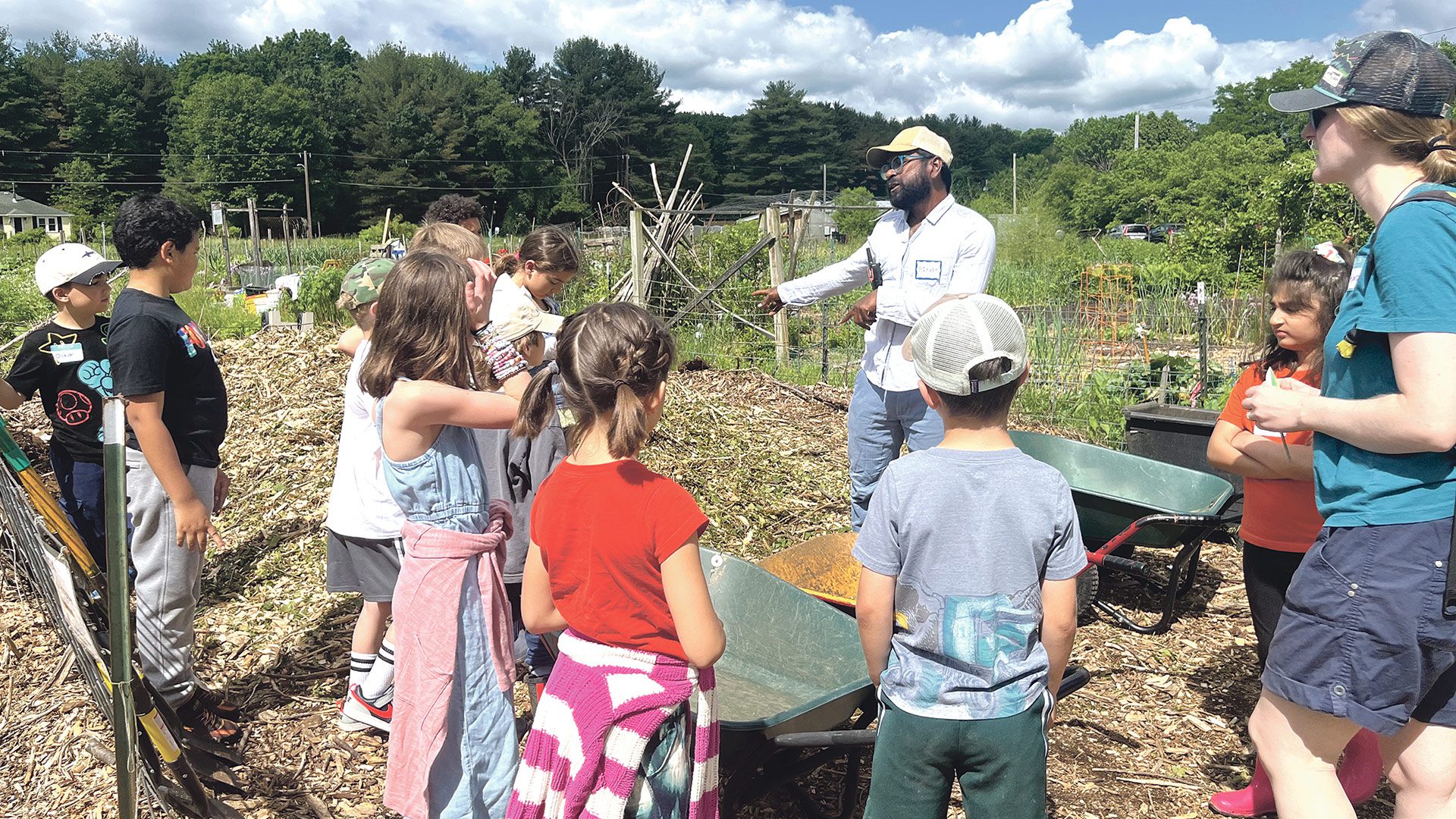
Meanwhile, the organization stages year-round farmers markets that offer more than 30 local farms and other food vendors a venue to connect directly with customers, and also runs a SNAP match program to double the spending power of SNAP recipients on nutritious, local farm products at its farmers markets.
It does all of this while ensuring that all its food-access programming is guided and steered by an advisory committee staffed by individuals with lived experience of food insecurity.
“Food should be a human right,” Klein said. “More and more in the field of food justice, we’re talking about something called food sovereignty, which is one more step in the direction of really empowering people to not just have access to fresh, healthy food, but culturally appropriate food, so they can make decisions about what they want to eat, and giving farmers the decision making to control the food system so we’re not reliant on corporations. That’s what we are looking toward at Grow Food Northampton.”
Community Minded
“Grow Food in Northampton” was originally the name of an online listserv created to give Northampton-area food activists a means of quick communication about issues they were concerned with, especially farmland preservation.
In 2009, upon learning that the city had signed a purchase agreement to buy the Bean Farm in Florence for the purpose of creating sports fields, the members took actions to preserve the land for agriculture, including petitions, historical research, public advocacy, and engaging the Trust for Public Land (TPL) in an effort to save both the Bean Farm and the nearby Allard Farm.
“More and more in the field of food justice, we’re talking about something called food sovereignty, which is one more step in the direction of really empowering people to not just have access to fresh, healthy food, but culturally appropriate food, so they can make decisions about what they want to eat.”
“People in the community got really concerned because, in Massachusetts, since the 1940s, we’ve lost over 75% of the farmland in the state,” Klein said. “If you lose farmland, you can’t grow your own food, and you become dependent on the national food system.”
Their efforts were successful; in four months, the advocates raised $700,000 for a down payment on the land. And when TPL and the city agreed to permanently preserve the 180 acres at the two farms, 40 of the listserv activists incorporated as a nonprofit organization in order to purchase 121 of those acres and create a sustainable community farm — and Grow Food Northampton evolved from there to the multifaceted land, food, and education entity it is today.
The education aspect takes several forms, Klein explained, from taking public-school students on field trips to adult education on topics ranging from agro-ecological gardening to farming to gardening for climate change.
“We control invasives without using chemicals, so it’s a completely organic venture,” she explained. “The food-access program includes a farmers market, and we have brought probably close to a million dollars each year to the local economy through our farmers market. A full 25% of that is people who are food-insecure who are using our SNAP match to double the amount of money they can spend on local vegetables and fruits and healthier local food.”
That’s something the organization is excited about, she said, as it speaks to the mission of helping people who most need access to healthy food.
“It’s not a bougie farmers market that only rich people can shop at, but 25% are people who are living with food insecurity. We also conduct a free mobile farmers market program; we purchase from local farms within a 50-mile radius of Northampton — produce and other farm foods, from wheat and dairy to eggs. We go to as many as 16 different low-income housing sites, and we distribute them for free.”
At those sites, volunteers also install community gardens so residents can learn to grow their own food, she noted. “We bring all of the seedlings, and people choose what they want to grow, so it’s culturally appropriate.”
The nonprofit’s food-access advisory committee — as noted earlier, staffed with people with lived experience of food insecurity — works to put together these programs, determining what people in low-income housing want and need to enjoy healthy, local food.
There’s also a climate-impact element to a thriving local food economy, Klein noted.
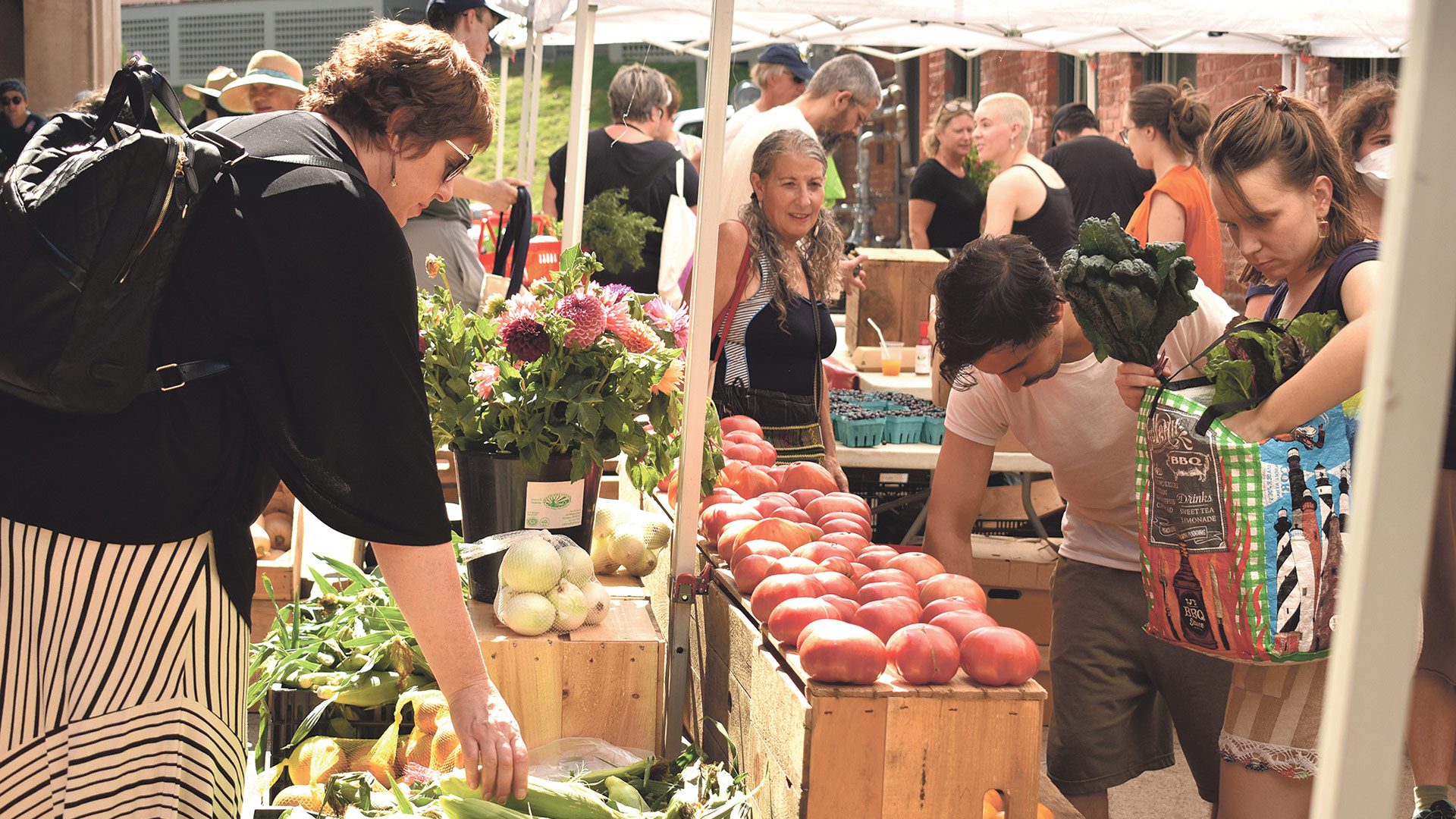
“It’s becoming more and more apparent, especially with climate change, that we need to grow things here in our community. Instead of shipping fruits and vegetables 3,000 miles from California, creating massive amounts of pollution along the way, we are able to affect the climate economy as well.
“So we’re lowering carbon emissions, supporting local families to grow their own food, and supporting farmers to grow food for this community. When we do our farmers markets, we’re seeing people purchase goods that came from 10 miles away, that were picked that morning or the day before. It’s amazing.”
And, when compared to vegetables sold in supermarkets that were picked two weeks ago or more, studies have shown that fresher produce is more nutrient-dense, Klein said.
“It’s anecdotal, but the people who participate in our food-access program tell us that they have gotten healthier, that their diabetes markers are much better since they started participating in our program. Families are eating more vegetables. Kids are responding better to meals with local vegetables because they just taste better. So we really do have an ability to help people’s health, which improves a community.”
Lending a Hand
On Jan. 1, Grow Food Northampton announced that Michael Skillicorn — an eight-year veteran of the nonprofit who has served as program director and associate director — recently joined Klein as co-executive director.
“This is something that has been in the works for about four years,” Klein said. “We’re working to flatten the hierarchy, and it was incumbent upon us to share leadership at the top. Michael is an extraordinary individual, really talented, and I’m so excited to work side by side with him to direct the organization to be a larger organization.”
To continue to expand, GFN needs to grow its funding, which is raised solely through grants (from both government and private institutions) and donations. Anyone can support its work by visiting growfoodnorthampton.org and clicking the donation button.
“Were we to get an amazing windfall, I think we would definitely expand our food-access programming so we can serve more people in the community who are food-insecure,” Klein said. “We would like to work a lot more with unhoused people to make sure that they’re eating fresh, healthy, nutritious food. We see it as a cornerstone of their health and well-being, and it would give them more of a leg up to find solutions to the fact that they are unhoused.”
It’s not a new idea, she added. “During the pandemic, we were setting up markets outdoors in locations that were adjacent to homeless encampments. We were able to serve those communities better, but we would like to do that as much as possible in the future. And we’d love to expand our education programming. It’s all a matter of being able to raise the funds to do all of that.”
Volunteers are always welcome, too.
“There are so many ways that people can support nonprofit organizations, and money is just one of them,” Klein said. “We also have lots of volunteer opportunities in everything that we do, from our food-access program to our land-stewardship work. We have a range of ways in which people can get involved in this, and not just as donors.”

